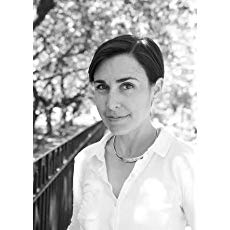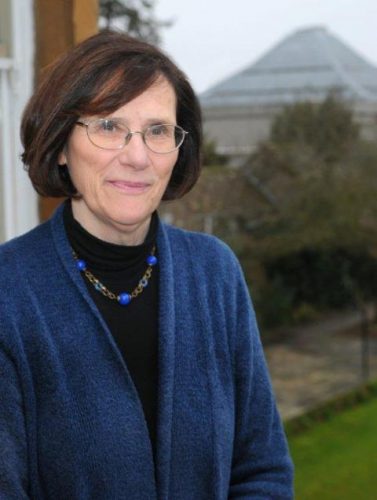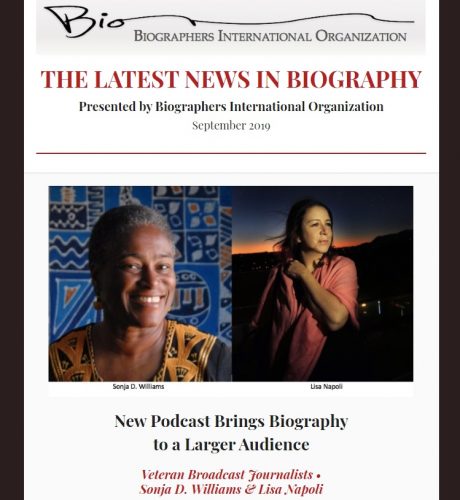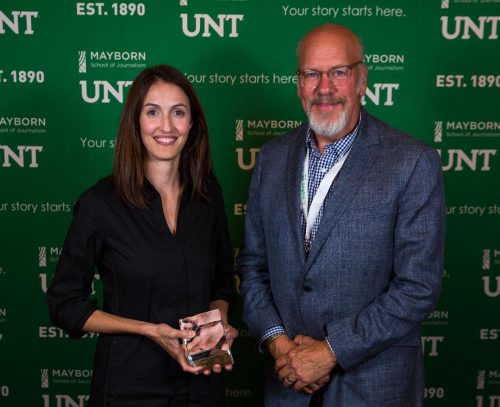December 10th, 2019
By Dona Munker, New York Correspondent

Janice P. Nimura, a BIO member, earned a Master’s Degree in East Asian studies at Columbia University.
Every serious biographer knows that only the most intense engagement with a subject can compel the writer to spend years in the archives and construct a narrative that has the energy it needs to carry both writer and reader across the finish line. Which is why, as Janice P. Nimura suggested to an audience at the City University of New York Graduate Center in October, biographers always long to “find a subject they can fall in love with.”
Speaking at the Fall 2019 Dorothy O. Helly Works-in-Progress Lecture, an event presented twice a year by the Women Writing Women’s Lives Seminar, Nimura offered her first book as an illustration of her point. Daughters of the Samurai (Norton, 2015), the story of three 19th-century Japanese girls sent by their government to the United States to learn Western ways and bring them back to Japan—Nimura’s husband is Japanese and she speaks the language—remembers researching it and telling it as an “ecstatic experience.” When the book was finished, she said, “I wanted to do it all over again—immediately!”
For several years, however, nothing appeared on the horizon and Nimura, who considers herself an impatient reader (“I have the attention span of a gnat”) and likes biographies to have “lots of fast narrative and be crammed with interesting bits of information,” was frustrated and discouraged. Then she came across the story of Elizabeth Blackwell (1821–1910), the first woman to earn a medical degree in the United States, and her younger sister Emily (1826–1910), who was the third. In 1857, the two collaborated to found the New York Infirmary for Indigent Women and Children, a full-fledged hospital and the first to train and employ women doctors and nurses exclusively and be dedicated to serving the medical needs of women. (It is now New York University Downtown Hospital.)
Nimura had never heard of either, but she was drawn to stories of female partnerships and had always been interested in science and medicine. Moreover, the Blackwell sisters presented a golden opportunity, since Elizabeth had been written about only in incomplete, prettified accounts for adults and grade-schoolers and Emily was all but absent from the secondary literature.
Nimura was intrigued but also “terrified.” Here was no “bite-sized” story, like the subject of her first book. The Blackwell sisters came from a prominent abolitionist family of nine children; Antoinette Brown, the first American woman to be formally ordained as a minister by a major denomination, was their sister-in-law; another sister-in-law was the suffrage leader Lucy Stone; and their extended circle included many figures about whom volumes have been written. Since “they all wrote letters to each other,” the papers, all told, comprised hundreds of thousands of pages across multiple archives. Moreover, the sisters themselves weren’t exactly designed to warm the heart of a feminist biographer. Elizabeth was domineering and opinionated, and “didn’t like people and wasn’t interested in science,” but had been inspired by reading Margaret Fuller’s Woman in the Nineteenth Century to fight her way into medical school “in order to make a point”: if she graduated, “no one would be able to claim that she or any other woman couldn’t be a doctor.” She was also deeply conservative, didn’t approve of woman suffrage, and wanted medical schools to instruct all their students in Christian values, as well as medicine. Emily was more modest and self-effacing (and unlike her older sister, Nimura said, “she didn’t blow her own horn about her medical views”), as well as a more devoted medical practitioner, but there was also far less material about her, which made warming up to her difficult. Finally, in general, both dismissed most women as “a lot of ninnies.”
Fortunately, a passion for telling a life story doesn’t necessarily have to arise from a subject’s innate charms. As Nimura has pointed out elsewhere, “There’s the kind of love that overtakes you unexpectedly and the kind you cultivate, consciously.” With luck, if she drew a mental line around the territory she had to explore and “cultivated” it as though it were a plot of fertile soil in her research, she would come to know the sisters and their lives so intimately that she would have both the detailed information that propels a narrative forward and the enthusiasm that would make it the kind of biography she hoped to write.
For a while, as she “dug through piles of letters and watered the seeds of ideas,” she found herself fighting a persistent fear that the investment of so much time and toil wouldn’t pay off after all. Gradually, however, as scenes and events from letters and other research began to take shape, and as her subjects and their milieu took on greater life and immediacy from the increasingly detailed context that was forming in her mind, she felt more and more connected with “their moods, their doubts, their seven eccentric siblings.” Occasionally, to the annoyance of other researchers, she would even find herself “snorting out loud” over some characteristically sardonic remark, or “gasping” at a gruesome description of a medical procedure, or exulting in the discovery of an amusing anecdote about the indomitable Elizabeth’s storming of the male-only medical barricades. Now she craved opportunities to see what vivid details and scenes would emerge from her research and writing.
Asked if she consciously tries to retain a mental outline of the narrative she is working on, Nimura replied that in general she does not; rather, she prefers to let telling details determine the shape of the narrative. “I do less drawing back than honing in,” she said. “I prefer to focus more on the shiny things. When you do that, the story starts to emerge [by itself].” She has no doubt at all about that story’s importance. In a post-2016, post-#MeToo America, she told her listeners, the Blackwell sisters’ lives and achievements are more relevant than ever to both adult and YA readers. “Elizabeth,” she said, “chose medicine because she wanted to make the point that women could do anything they wanted if they had the talent for it. She believed that it was up to women to make civilization progress.”
Dona Munker is the writer and co-author of Daughter of Persia: A Woman’s Journey from Her Father’s Harem through the Islamic Revolution. She is currently working on a book about the suffragist Sara Bard Field and her “free-love” affair with the lawyer C. E. S. Wood. Her blog, Stalking the Elephant, is about how biographers imagine and tell other people’s lives.





